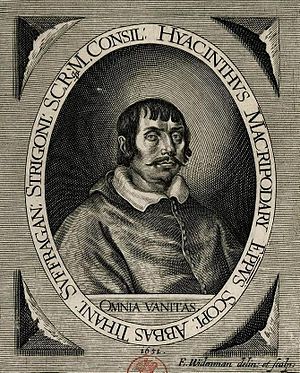| Yakinthos Makrypodaris | |
|---|---|
 Portrait of Giacinto Macripodari from 1651 Portrait of Giacinto Macripodari from 1651 | |
| Other post(s) | Bishop of Csanad, Titular Bishop of Skopje |
| Orders | |
| Ordination | 1645 |
| Consecration | 1668 |
| Personal details | |
| Born | Yakinthos Makrypodaris c. 1610 Chios, Greece |
| Died | 30 July 1672 (aged 61–62) |
| Nationality | Greek |
| Denomination | Roman Catholic |
| Occupation | Priest, friar, writer |
Giacinto Macripodari (Greek: Υάκινθος Μακρυποδάρης, Yakinthos Makrypodaris, Hungarian: Jácint Ferenc Makripodári, Latin: Hyacinthus Macripodarius, Romanian: Giacinto Ischiota c. 1610 – 1672), O.P. was a 17th-century Greek scholar and Dominican friar. He was a Dominican missionary in Moldavia and was bishop of Skopje (1645–1649), custodian canon of Esztergom and Bishop of Csanád. His sermons had great success both in Greek and Italian.
Biography
Giacinto Macripodari was a Greek born on the Aegean island of Chios, which was part of the Ottoman empire at the time, in 1610. His family were Catholic and during his youth he traveled overseas to further his education. From 1632 to 1636 he studied in a theological school in Paris. After he completed his studies Macripodari traveled back to his native Chios where he became vicar and taught at the Dominican monastery.
Several years later the learned Macripodari moved to the Christian quarter of the Ottoman empire's capital, Constantinople, where he soon became vicar of the Dominican monastery. His sermons had great attainment both in the Greek and Italian languages. In 1645 Macripodari became the confessor of the German envoy to Constantinople Alexander von Greiffenklau, this association and support ultimately helped further his career.
Macripodari was consequently appointed custodian canon of Esztergom in 1645. He traveled to Vienna where Ferdinand III, Holy Roman Emperor nominated him as the titular bishop of Skopje, a post he held from 29 July 1645 to 1649. Subsequently, Macripodari sought to obtain a regular episcopal seat. He migrated to Moldavia in 1646, where he stayed in Jassy, its capital city. In 1658 he was appointed by Leopold I, Holy Roman Emperor, as Bishop of Csanád. He continued to serve until the 2 May 1668. Makripodari then moved to Nagyszombat where he was the assistant bishop of the Archbishop of Esztergom. Makripodari died in 1672.
References
- ^ Dominicans. Provincia romana (1942). Memorie domenicane, Volumes 59–63. Convento di S Maria Novella. p. 35.
GIACINTO MACRIPODARI – Vescovo di Skoplje, nominato dal re d'Ungheria, 1645, luglio 29; confermato dalla SS. 1649, ott. 11- Vescovo di Csanàd, nominato dal re 1658, febbr. 27; confermato dalla SS. dopo il 2 maggio 1668. — Archivum FF.
- ^ Ehrenpreis, Stefan; Schilling, Heinz (2007). Wege der Neuzeit: Festschrift für Heinz Schilling zum 65. Geburtstag. Duncker & Humblot. p. 234. ISBN 978-3428123940.
... Bischof Giacinto Macripodari war ein griechischer Dominikanermönch von der Insel Chios. . Da er als Untertan des Sultans geboren worden war, konnte er ungehindert durch Türkisch-Ungarn reisen.
- ^ Tóth, István György. Missions and Missionaries among the Csángó Hungarians in Moldova in the 17th Century (PDF). pp. 145–147.
Dominican Giacinto Macripodari, future Bishop of Csanád, was one of the most interesting Dominican missionaries in Moldavia. Macripodari was born on the island of Chios, under Ottoman rule, in the early 1610s, consequently the Moldavian sources often refer to him as Giacinto Ischiota. He studied theology in Paris for four years, between 1632 and 1636. Then he became vicar and taught at the Dominican monastery of Chios. Subsequently he worked in the Christian quarter of Istanbul as the vicar of the Dominican monastery. His sermons had great success both in Greek and Italian. The learned Macripodari became the confessor of Alexander von Greiffenklau, imperial envoy to Constantinople, in 1645. This connection and assistance gave an impulse to his career and helped him to the mitre. In 1645, although he was still living in Constantinople, he was appointed custodian canon of Esztergom. He arrived in Vienna in the same year and King Ferdinand III nominated him, at the intercession of the envoy of Istanbul, the bishop of the Macedonian Skopje.… He travelled to Poland several times – according to his Franciscan opponents he trafficked in various goods. Macripodari probably knew it well that even though had the support of the (naturally, Greek Orthodox) confessor of Vojvode Lupu Vazul, he would not achieve anything in the vojvode's court without presents. Besides, it is likely that he wanted to obtain the title of the Bishop of Bákó from the Polish king, the liege of Moldavia. Many backed the plan of Macripodari to become Bishop of Bákó, including the vojvode himself. There were many Greeks among the boyars and the merchants of the court who, although they were Orthodox, got on well with a fellow Greek, the Chian Macripodari.
- ^ Bahlcke, Joachim (2005). Ungarischer Episkopat und österreichische Monarchie: Von einer Partnerschaft zur Konfrontation(1686–1790). Franz Steiner Verlag. pp. 104–105. ISBN 3515087648.
Im Fall des Graner Domherm Hiacynth Macripodari etwa, den Ferdinand III. Im Juli 1645 zum Titularbischof von Skopje emannt hatte, kam es in Rom … Im Januar 1647 und im April 1649 emeuerte der Konig die Nomination auf Bitten und Drangen des griechischen Dominikaners, … Erst danach leitete Kardinal Girolamo Colonna den Informativprozeb fur Macripodari ein, der wenig spatter vom Heiligen Stuhl als Titularbichof von Skopje bestatigt und konsekriert wurde.
- Hofmann, Georg (1934). Vescovadi cattolici della Grecia. Pont. Institutum Orientalium Studiorum. p. 34. OCLC 403482.
Nell' Albania fu vescovo Giacinto Macripodari a SCOPIA (Uskub) 1649–1669.